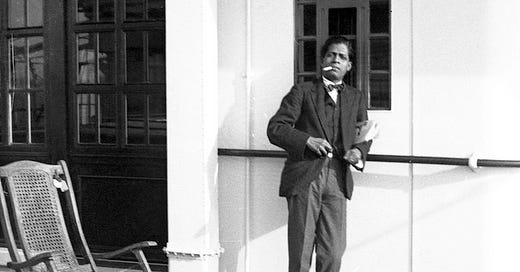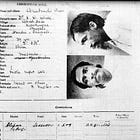Niranjan Pal (called Nanu) was the son of Congressman Bipin Chandra Pal. Bipin Chandra Pal, along with Bal Gangadhar Tilak and Lala Lajpat Rai, brought a new strain of thought to the Indian National Congress, focusing on Indian manufacturing and Poorna Swaraj (complete independence).
The Tram Revolution
The part of his autobiography that we’re interested in today happens in 1908-1909, when he was about 20. Calcutta at this time is afire with talk of revolution and independence. Niranjan cannot help but be affected by that.
We all know the famous story of Gandhi where he is asked to get off a train because he is sitting in a seat reserved for whites. This episode inverts that. He writes:
After an exciting meeting, we were feeling quite elated as we boarded a tram to take us home. We took the tram which was to run along the newly opened line from Esplanade to Kalighat via Alipore, the fiery speeches at the Federation Hall still ringing in my ears, and my blood was boiling when I noticed a burly European, seated just behind us, arrogantly put his booted feet on our bench. I indignantly drew the attention of my brother-in-law and Indu-da to the man’s insolence, but they seemed to treat the matter lightly and asked me not to be childish
I was not to be denied the chance of doing something heroic, and, taking the initiative, pounced on the man demanding he take his feet off of our seat and behave himself. My sudden outburst must have taken him by surprise, and he growled, “Get away, you damned nigger!”
I grabbed him by his tie and rained a few blows on him. This seemed to calm him down. He removed his feet. I relaxed, and was shocked to see him take a revolver out of his pocket. All three of our leapt at him, and wrested the weapon away before he got the chance of using it. Before he could recover, we had jumped off the running tram and sprinted across the maidan till we came to the junction of Chowringhee and Lower Circular Road. We hired a hackney carriage, then changed into another one after a short distance, and finally boarded a tram before reaching home.
Only then did the full implication of our rash act dawn upon us. Indu-da lost no time in shaving off his beard, and left for his home at Ulubaria, a Calcutta suburb opposite Budge Budge on the Hooghly. I later learnt that he had missed the last train from Howrah and fearful of falling into the hands of the police, walked the whole of twenty miles to reach home.
My brother-in-law was more level-headed. He realized there was no immediate danger, stayed the night with us, then left for his home next morning, leaving the revolver with me. I was dancing with joy, and hardly slept all night with the weapon under my pillow. This was the opportunity I had been looking for, and had dreams of becoming a National hero and martyr after putting the revolver to proper use against some Englishman. Later, my brother-in-law quietly left for his village home at Kalikachchah in Tipperah district. This left me in sole possession of the prized trophy!
I had no hesitation in bragging about our brave exploit to all and sundry, and found Ullaskar Dutt an interesting listener. He was my brother-in-law’s first cousin, and no one had yet guessed, a leading member of the first batch of Bengal revolutionaries. Calling me aside, he asked me to be shown the revolver which I had hidden on the roof. He tested it by firing into the air, then asked me to let him take charge of it for safe custody. I felt disappointed, but could not refuse.
The way this situation just keeps escalating is quite something. They start with listening to a fiery speech, and suddenly, a real revolutionary who is secretly making bombs, has a gun belonging to a British tea planter.
We have recently discussed Ullaskar Dutt when discussing how the Calcutta revolutionaries discovered and shot dead their comrades who turned approver.
There’s more information about him in this older post:
But in short, Ullaskar Dutt had been thrown out of Presidency college because he beat up a British professor who talked ill of Indians. He had joined Barin Ghosh, and when they had decided they needed bombs, he had gone back to Presidency College to work in the chemistry lab of Sir JC Bose, where he learned how to make bombs.
At this point in the story, Ullaskar had made a grenade that had been thrown by Khudiram Bose and Prafulla Chaki at an unpopular magistrate, but they had missed and two women had died instead. The British were trying to catch those responsible, and Ullaskar, Hemachandra Das, Barin and Aurobindo Ghosh were trying to see what to do.
Hence, this next part is interesting:
A few days later, Ullaskar babu was carrying a trunk from a garden house in Muraripukur unknowingly, followed by a plain-clothed policeman. The garden house was to become a landmark in the history of our revolutionaries.
The trunk was carried to the residence of Sri Nagen Gupta, Ullaskar’s cousin, who ran an Ayurvedic dispensary. Blissfully unaware of what the trunk contained, he had no hesitation in allowing him to keep it in the house for the night. Ashok Nandi had been to the theatre, and it being too late to get home, decided to spend the night with Nagen babu.
The decision was fatal. The police with the information, having tailed Ullaskar Babu, raided the house that night. They discovered the trunk containing live bombs! All three, Ullaskar, Nagen and Ashok were arrested and, when I heard the news, how I cursed my luck. I too was to have accompanied Ashok to the theatre, but sheer lack of funds had prevented me from doing so. I was forlorn that a cruel fate should have made me miss the golden opportunity.
The Muraripukur comrades led by Barin Ghosh, brother of the renowned savant Sri Aurobindo, were taken into custody by the police. Aurobindo, along with Ullaskar, was the arch-leader of the Indian revolutionaries. He was arrested from his residence at Grey street. The trial that followed was sensational, particularly due to CR Das’s masterly defence of Aurobindo that led to his acquittal.
All the others, including the innocent Nagen and Ashok, were sentenced to transportation for life. Ashok contracted tuberculosis during his detention at the Andamans and was later released, but he did not survive his freedom very long. I cannot think of a worse instance of miscarriage of justice than what was suffered by poor Ashok and Nagen. They had truly been innocent all along.
Wow.
Despite knowing this is the kind of horror that awaited them, Niranjan yearns to be one of them. Part of it could be just his youth, but Khudiram Bose was also just 19. Maybe it wasn’t about age. Barin Ghosh was almost 30 at this point, and Aurobindo Ghosh was almost 40. This probably was just the fervour in Calcutta.
Niranjan Pal talks about it further:
The courthouse had become verily a place of pilgrimage. We would stand on the streets waiting for the prisoners to be brought to the court in well-guarded police vans from Presidency Jail. We cheered loudly as the prisoners alighted from the van, proud, defiant and singing National songs before being escorted into the court room. Some of the songs were very inspiring, and a few had come down from India’s first war of independence in 1857, which the British historians chose to dub as the “Sepoy Mutiny” and this is what the school children were taught. Some of the songs had been composed by the Mughal Emperor Bahadur Shah Zafar, and I remember the opening lines of one of them. Loosely translated, it said “Come, brothers, O ye youth of India, come be quick with the sword, for the Britishers are oppressing you.”
It was truly a sight for the Gods to see - the handcuffed and heavily guarded patriots as they marched happy and defiant, heads held high, through line upon line of policemen and European sergeants.
I was extremely happy as I yearned to be one of the heroic crowd. For nights I would keep awake wondering how I could strike a blow against the British and gain recognition for my part in snatching away a revolver from a European.
I couldn’t find this song he references. It could be this poem of Bahadur Shah Zafar:
Ghaziyon Mein Boo Rahegi Jab Tak Imaan Ki
Tab To London Tak Chalegi Teg Hindustan Ki
Which means
So long as the soldiers retain their faith and pride
The Indian sword will not relent till it humbles London's might
But I’m not sure. In any case, not a fan of anything that talks about Ghazis.
Anyway. While Ullaskar and his friends are facing the noose, or at least a long sentence, Niranjan feels like he is missing out, and does something foolhardy.
It was then that I chanced to read about the Bengali Chamber of Commerce having passed a resolution against the inaction of the police failing to apprehend the desperadoes who had escaped with a revolver from a European tea planter in a running tram car. I was in the news, for it clearly referred to us!
I promptly wrote an anonymous letter to the Commissioner of Police implicating myself in the robbery.
Oh my god, no!
But somehow he is saved.
The letter reached the hands of Sri Binod Gupta, an efficient and loyal officer of the CID and who happened to be a cousin of my Pishima. He went to pishima and suggested that I should be sprinted away to avoid arrest. The police were already in contact with the tea planter who was to keep a watch on our house and try identifying me.
Father got the biggest shock of his life when Pishima told him what happened, and I was made to narrate details of our escapade. I was hastily taken to the residence of Sri Rajani Nath Roy, Accountant General of Bengal, in a closed hackney carriage. Father rightly believed that the police would not think of looking for a culprit within the precincts of the house of such an important Government officer. There was no possibility of Sri Roy being summoned for harbouring a revolutionary.
I learned that the tea planter had come to Hazra Park, opposite our house, with a surveying instrument, whilst keeping a keen lookout for me. Sri Binod Gupta had actually produced another young man suspected of being Niranjan Pal, and to the credit of the tea planter, he did not identify the man produced before him as his assassin, and at least for once, an innocent one did not suffer.
Phew.
What happened subsequently, though, was Bipin Pal decided he didn’t want to lose his son to prison, and took him away to London in hopes that he would be safe.
What he didn’t expect, though, was that in London, Niranjan Pal would befriend Savarkar, who was actually the originator of the bomb manual that the Alipore revolutionaries had used. The police were at this point trying hard to infiltrate India House to get Savarkar for the bomb manual.
But that’s a tale for another day.





